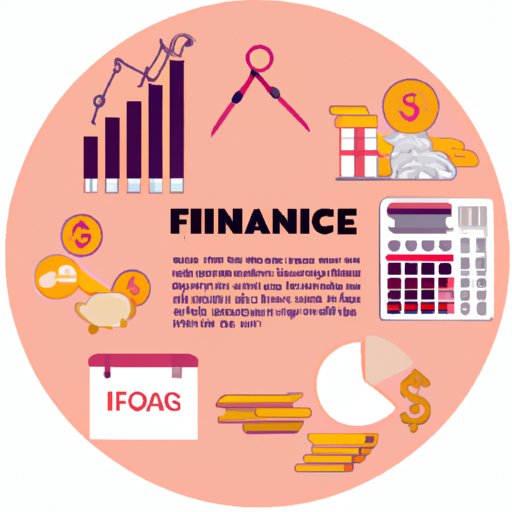Introduction
Financial concepts are the building blocks of financial success. They are the basic principles that guide individuals and businesses in making sound financial decisions and managing their money. Understanding financial concepts is essential for achieving financial security and building wealth. It can also help individuals make informed decisions when it comes to investing, budgeting, and planning for retirement.
Exploring Financial Concepts: An Overview of the Basics
In order to understand the importance of financial concepts, it is important to first gain an understanding of what they are. Financial concepts are the fundamental ideas behind personal finance and economics. These concepts include assets, liabilities, equity, cash flow, risk management, and investment strategies.
What are Financial Concepts?
Financial concepts are the basic principles of personal finance and economics. They provide the framework for making sound financial decisions and managing money. They are the tools used to understand how money works and how to use it to achieve financial goals.
Types of Financial Concepts
Financial concepts encompass a wide range of topics including:
Assets
Assets are items of value owned by an individual or business. Examples of assets include cash, stocks, bonds, real estate, artwork, and jewelry.
Liabilities
Liabilities are debts owed by an individual or business. Examples of liabilities include credit card debt, student loans, mortgages, car loans, and medical bills.
Equity
Equity is the difference between an individual’s or business’ assets and liabilities. Equity is often referred to as net worth.
Cash Flow
Cash flow is the movement of money into and out of a business or individual’s accounts. Positive cash flow indicates that more money is coming in than going out, while negative cash flow indicates that more money is going out than coming in.
Risk Management
Risk management is the process of identifying, assessing, and mitigating risks associated with investments and other financial activities. Risk management helps individuals and businesses protect themselves from financial losses.
Investment Strategies
Investment strategies are plans for investing money in a variety of vehicles such as stocks, bonds, mutual funds, and real estate. Investment strategies vary depending on an individual’s or business’ goals and objectives.

Financial Concepts 101: A Comprehensive Guide
Now that you have a better understanding of the basics of financial concepts, let’s explore how to apply them in everyday life. Here are some tips for mastering financial concepts and maximizing your financial experience.
Developing a Financial Plan
Creating a financial plan is the first step in mastering financial concepts. A financial plan outlines an individual’s or business’ short-term and long-term financial goals and provides a roadmap for achieving those goals. A financial plan includes budgeting, saving, investing, and other financial activities.
Creating a Budget
A budget is a tool used to manage an individual’s or business’ income and expenses. A budget helps individuals and businesses track their spending, identify areas where they can save money, and prioritize their financial goals.
Investing in Stocks, Bonds, and Mutual Funds
Investing is a key component of financial success. Investing involves putting money into stocks, bonds, mutual funds, and other investment vehicles in order to generate returns. Investing can be risky, so it is important to understand the basics of investing before getting started.
Understanding Tax Implications
Taxes are an important part of managing money. Taxes affect an individual’s or business’ income, investments, and other financial activities. It is important to understand the different types of taxes and how they can impact your financial situation.
Retirement Planning
Retirement planning is an important part of financial planning. Retirement planning involves setting aside money for the future, investing for long-term growth, and taking advantage of tax benefits. It is important to start planning for retirement early in order to ensure a secure financial future.

How to Master Financial Concepts and Maximize Your Financial Experience
Once you have a basic understanding of financial concepts, there are a few steps you can take to master them and maximize your financial experience. These include setting financial goals, adopting good financial habits, researching financial products and services, and utilizing financial tools and resources.
Setting Financial Goals
Setting financial goals is the first step in mastering financial concepts. Financial goals should reflect an individual’s or business’ values, priorities, and lifestyle. Examples of financial goals include saving for a down payment on a home, paying off debt, and saving for retirement.
Adopting Good Financial Habits
Good financial habits are essential for managing money effectively. These habits include tracking spending, living within your means, and setting aside money for emergencies. Adopting good financial habits can help individuals and businesses reach their financial goals.
Researching Financial Products and Services
Researching financial products and services is an important part of mastering financial concepts. Financial products and services such as savings accounts, investments, and insurance policies can help individuals and businesses reach their financial goals. It is important to research these products and services before making any decisions.
Utilizing Financial Tools and Resources
There are many financial tools and resources available to help individuals and businesses manage their money. These tools and resources include budgeting apps, online calculators, and financial education courses. Utilizing these tools and resources can help individuals and businesses reach their financial goals.

Achieving Financial Security Through Understanding Financial Concepts
Understanding financial concepts is essential for achieving financial security. Financial security can be achieved by learning to make sound financial decisions, practicing smart money management, taking advantage of tax benefits, and building wealth.
Learning to Make Sound Financial Decisions
Making sound financial decisions is essential for achieving financial security. This includes understanding the basics of investing, budgeting, and retirement planning. It is important to do research and seek advice from professionals when making financial decisions.
Practicing Smart Money Management
Smart money management is key to achieving financial security. This includes tracking spending, living within your means, and setting aside money for emergencies. Practicing smart money management can help individuals and businesses reach their financial goals.
Taking Advantage of Tax Benefits
Taxes can have a significant impact on an individual’s or business’ finances. It is important to understand the different types of taxes and how they can affect an individual’s or business’ financial situation. Taking advantage of tax benefits can help reduce an individual’s or business’ tax burden and achieve financial security.
Building Wealth
Building wealth is an important part of achieving financial security. Building wealth involves investing in stocks, bonds, mutual funds, and other investment vehicles. It is important to understand the basics of investing before getting started.
Strategies for Navigating Financial Concepts
Navigating financial concepts can be challenging, but there are strategies that can help. These strategies include establishing a support system, seeking professional advice, keeping up with financial news, and staying informed about market changes.
Establishing a Support System
Having a support system is essential for navigating financial concepts. This includes having friends and family members who can provide advice and guidance. It is also important to seek advice from financial professionals such as accountants and financial advisors.
Seeking Professional Advice
Seeking professional advice is an important part of navigating financial concepts. Financial professionals such as accountants, financial advisors, and lawyers can provide valuable insight and advice. They can also help individuals and businesses make informed decisions about investing, budgeting, and managing money.
Keeping Up with Financial News
Keeping up with financial news is essential for navigating financial concepts. Financial news can provide valuable insights into the markets, economic trends, and other financial topics. It is important to stay informed about changes in the economy and the financial landscape.
Staying Informed About Market Changes
It is important to stay informed about changes in the markets. This includes understanding the factors that can affect stock prices, bond yields, interest rates, and other financial indicators. Staying informed about market changes can help individuals and businesses make informed decisions about investing and managing money.
Applying Financial Concepts in Everyday Life
Understanding financial concepts can help individuals and businesses make informed decisions about money management. Here are some tips for applying financial concepts in everyday life:
Using Credit Wisely
Credit cards can be a useful tool for managing money, but it is important to use them responsibly. This includes paying off balances in full each month, avoiding high interest rates, and only using credit cards when necessary.
Protecting Your Identity
Identity theft is a serious problem that can have a devastating effect on an individual’s or business’ finances. It is important to protect your identity by using strong passwords, monitoring bank accounts, and shredding sensitive documents.
Making Smart Purchases
Making smart purchases is an important part of managing money. This includes understanding the cost of items and comparing prices before making a purchase. It is also important to avoid impulse buying and only buy items that are necessary.
Building an Emergency Fund
An emergency fund is an important part of financial security. An emergency fund is a savings account set aside for unexpected expenses such as medical bills and home repairs. Having an emergency fund can help individuals and businesses prepare for the unexpected.
Conclusion
Financial concepts are essential for managing money and achieving financial security. Understanding financial concepts can help individuals and businesses make informed decisions about budgeting, investing, and other financial activities. By setting financial goals, adopting good financial habits, researching financial products and services, and utilizing financial tools and resources, individuals and businesses can master financial concepts and maximize their financial experience.
(Note: Is this article not meeting your expectations? Do you have knowledge or insights to share? Unlock new opportunities and expand your reach by joining our authors team. Click Registration to join us and share your expertise with our readers.)
